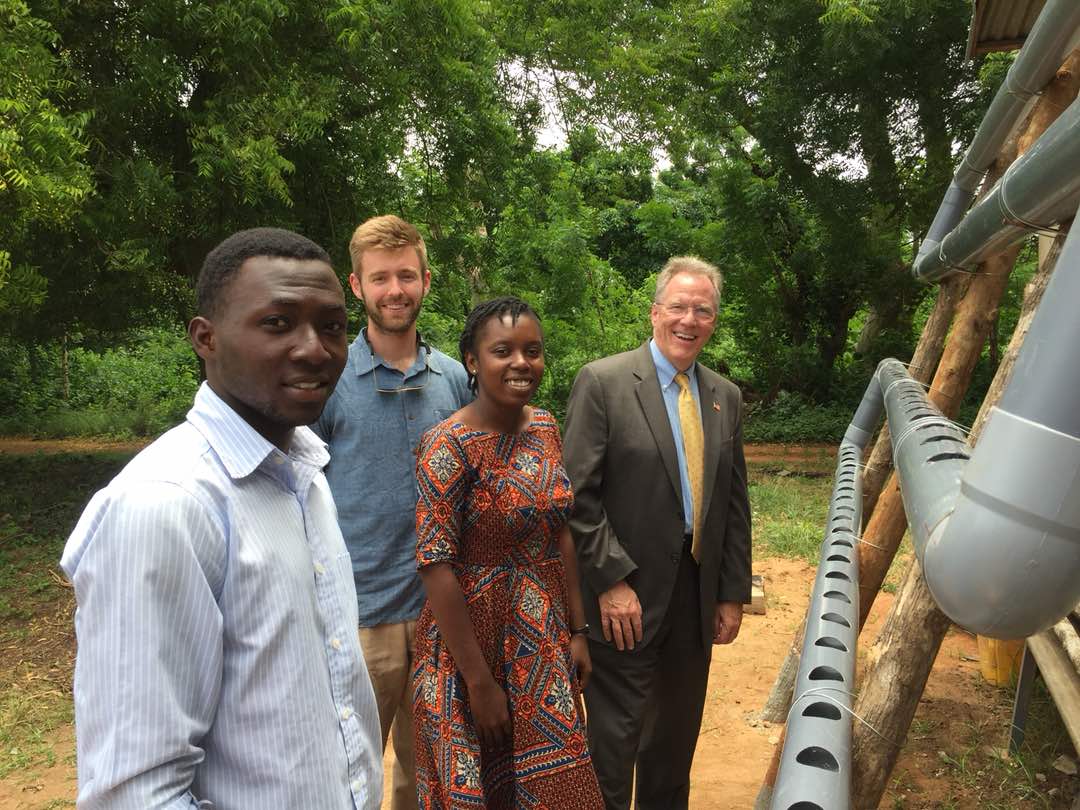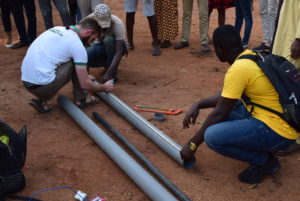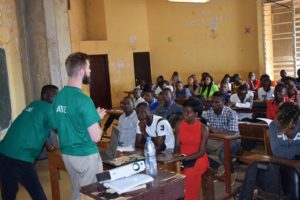Promoting Food Security Through Hydroponics
Scott Massey is the Founder and CEO of Anu, where he furthers his mission of fighting food insecurity and contributing to the United Nations’ zero hunger goal by deploying innovative hydroponic systems. Anu provides consumers with the GroPod©, a smart garden appliance with a Seed Pod™ subscription that could be described as the “Keurig for Food.” Their automated, hydroponic hardware combined with smart, cloud software allows anyone to become a farmer regardless of their climate, space, or existing knowledge of agriculture.
Scott utilized the networks he developed during his Reciprocal Exchanges in Togo and Cameroon to expand the reach of Anu and increase its impact both domestically and abroad. He debuted the GroPod at the Consumer Electronic Show (CES) 2020 and the company continues to grow, in part as a result of the experiences that Scott had through the Fellowship.
At the 2019 Mandela Washington Fellowship Summit, we had the opportunity to sit down with Scott and discuss his work with Anu and his Reciprocal Exchange experience. The content of the interview has been slightly edited for clarity.

Can you tell us about your Reciprocal Exchange projects?
In 2018, I went to Lomé, Togo to collaborate on a project with Delia Carmen Diabangouya, where we held a number of lectures talking on entrepreneurial skills training. I, myself, have been through the process of fundraising and patenting technology and innovation, and we gave that same instructional tutorial for the students there interested in starting their own businesses.
In the next days of the lecture series, we then taught them how to build a hydroponic system where we had a physical workshop, and we built one on campus and a maker lab to provide food for the students as well as a learning instrument for future curriculums. We then documented these lectures online and received feedback from individuals replicating the open-sourced design as far away as Somalia!

On your Reciprocal Exchanges, you tweaked the design of the hydroponic farming system to be specific for the location’s context. Can you tell us more?
We gained a number of insights about what materials were available in the area. It’s so easy for an American engineer to design a system that would work, but the question is whether or not that can be replicated at scale on the African continent at a reasonable cost with local materials. We learned about the materials that were available in the area and their manufacturing techniques, and we built the design around how the products are produced.
Even a year after completing our Reciprocal Exchange project in Cameroon, I have maintained active communication with Daliwa Joseph Bainamndi, who has been able to further refine the hydroponic farm into a more modular system that is transported to schools for practical hydroponic and entrepreneurial skills training.
This is an advantageous method to cultivate edible crops in Northern Cameroon specifically, because the long dry seasons of the Sahel do not disrupt hydroponic farming as they do conventional field farming, and these lectures have focused on training vulnerable individuals affected by the conflict in the region. It has been remarkable to continue supporting Joseph as he independently fundraises through various sources for sustainable growth of his organization’s impact.
Please tell us about the new professional relationships you formed as a result of your Reciprocal Exchange(s) and the Fellowship.
The Fellowship has given me a platform to market our social impact in Africa with the farms that we’ve built, and that has opened a number of sales and investment opportunities that we otherwise would not have had the opportunity to realize. We’ve also built relationships with a number of contacts in Africa who have engineering expertise that we may potentially contract for some jobs later.
While attending the 2019 Summit in Washington, D.C., I had the privilege to meet Linus Paul Hoza and Jerry Geofrey Mang’Ena, who are fish farmers in Tanzania. Although they were successfully growing their business, they were encountering challenges removing nitrogen from the fish waste in their circulation ponds. This challenge posed a unique opportunity as the fish excrement was inhibiting their continued growth; this is the exact compound needed by a hydroponically growing plant for fertilizer.
Together, we formed a proposal of integrating our technologies to build a commercial aquaponics farm that leverages the symbiotic relationship of plants to be fertilized when they organically purify the water for the fish without expensive equipment. This is especially valuable in Africa, where the farms need to be self-sustaining as much as possible to reduce dependency on foreign aid.
Our proposal was accepted by the U.S. African Development Foundation (USADF) Business Plan Competition for Fellowship Alumni. We plan to build this aquaponic farm, which will create several jobs in an emerging industry segment that would bolster the food security of Tanzania. We hope to export this business model across our African contacts to continue expanding across the continent.

Can you tell us about other ways the Fellowship has impacted your business?
The Reciprocal Exchange component of the Fellowship has provided us the opportunity to broadcast our offering as a consumer hydroponic company to more customers we would have otherwise not been able to reach domestically. Investors often inquire about the international impact of a business model when evaluating the market readiness conditions that would be mass adopted by a product or service. Thanks to the Fellowship, I have had the opportunity to build and continue building lasting projects contributing towards food security in Africa. This translates into a confident go-to-market plan for our startup company from these previous experiences.
Additionally, public speaking and project management to diverse audiences of various languages has forced me to become more concise in both communication and documentation to replicate successes and learn from failures. This is a crucial skill set that a young person must accomplish before they can manage a startup company that may hire remote workers in different time zones in an increasing trend.
The Reciprocal Exchange has allowed our team to remain true towards our goal of reaching the United Nations’ zero hunger goal in the developing world without financial disruption to the business. As we are able to utilize the expertise of our team knowledge in this emerging technology, we did not have to rely on investment capital to finance the project that would have been typically the role of a non-profit. This has translated into impact marketing in the United States to continue growing our brand awareness and social media following.
Fellowship Alumni and selected candidates for 2021 who are interested in learning more about this topic are encouraged to take the Food Security in a Crisis course, including an introduction with Scott Massey, through the Fellowship Portal. Learn more about the course.
As told to Alison Boland-Reeves. Edited by Trace Olson and Abbie Wade.